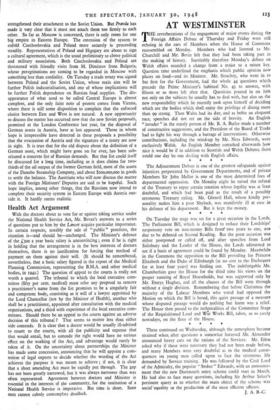AT WESTMINSTER
THE reverberations of the engagement of major events during the Foreign Affairs Debate of Thursday and Friday were still echoing in the ears of Members when the House of Commons reassembled on Monday. Members who had listened to Mr. Churchill and Mr. Bevin felt that they had been taking part in the making of history. Inevitably therefore Monday's debate on Welsh affairs sounded a change from a major to a minor key. Question time underlined the emphasis which public opinion now places on food—and its Minister. Mr. Strachey, who went in to bat first for the Government, had the whole 44 questions which precede the Prime Minister's habitual No. 45 to answer, with fifteen or so more left after that. Questions poured in on him not only on the subjects he usually has to deal with, but also on the new responsibility which he recently took upon himself of deciding which are the bodies which shall enjoy the privilege of dining more than 99 strong. Then Wales had its day, and as befits an eloquent race, speeches did not err on the side of brevity. An English " invader " in the stately person of Mr. R. A. Butler made a number of constructive suggestions, and the President of the Board of Trade had to fight his way through a barrage of interventions. Otherwise contributions, including the wind-up by Mr. Ness Edwards, were exclusively Welsh. An English Member remarked afterwards how nice it would be if in addition to Scottish and Welsh Debates there
could one day be one dealing with English affairs. * *
The Adjournment Debate is one of the greatest safeguards against injustices perpetrated by Government Departments, and of private Members Sir John Mellor is one of the most determined foes of departmental oppression. On Monday night he raised the refusal of the Treasury to repay certain taxation whose legality was at least doubtful, and which had been paid as the result of a possibly erroneous Treasury ruling. Mr. Glenvil Hall, whose kindly per- sonality makes him a poor Shylock, was manifestly ill at ease in
his defence of his department. But it kept the money. * * On Tuesday the stage was set for a great occasion in the Lords. The Parliament Bill, which is designed to reduce their Lordships' suspensory veto on non-money Bills from' two years to one, was due to be debated on Second Reading. But the great occasion was either postponed or called off, and after speeches from Lord Salisbury and the Leader of the House, the Lords adjourned to see if a basis of agreement could be found by Monday. Meariwhile in the Commons the opposition to the Bill providing for Princess Elizabeth and the Duke of Edinburgh (at no cost to the Exchequer for at least four years) was fizzling out. The indefatigable Mr. Chamberlain gave the House for the third time his views on the proper running of Royal Households, but was supported only by Mr. Emrys Hughes, and all the clauses of the Bill went through without a single division. Remembering that before Christmas the majority of the Labour Members who voted had opposed the Motion on which the Bill is based, this quiet passage of a measure whose disputed passage would do nothing but harm was a relief. The House then passed to the technicalities of the Committee Stage of the Requisitioned Land and WI. Works Bill, taken, as so rarely nowadays, on the floor of the House. * * * * These continued on Wednesday, although the atmosphere became strained when, after questions a somewhat harassed Mr. Alexander announced heavy cuts on the rations of the Services. Mr. Eden asked why if these were necessary they had not been made before, and many Members were very doubtful as to the medical conse- quences on. young men called upon to face the strenuous life demanded by Service training. He was followed by the Civil Lord of the Admiralty, the popular " Stoker " Edwards, with an announce- ment that the new Dartmouth entry scheme could start in March. He had also to face many questions, including Sir Arthur Salter's pertinent query as to whether the main object of the scheme was
social-equality or the production of the most efficient officers.
J. A. B.-C.


































 Previous page
Previous page